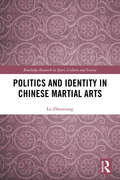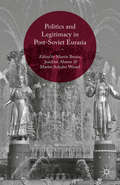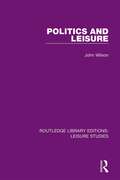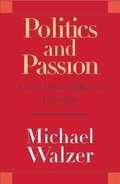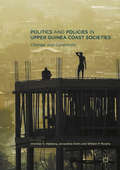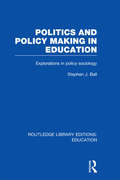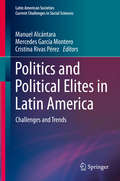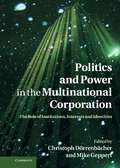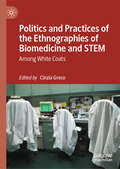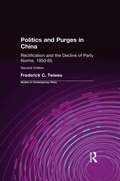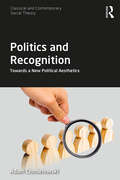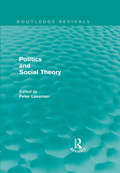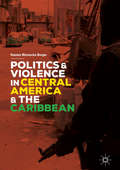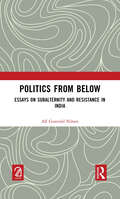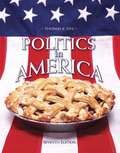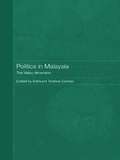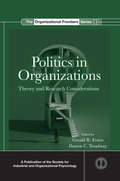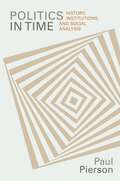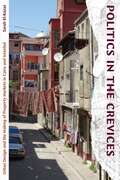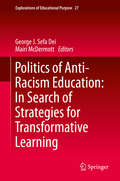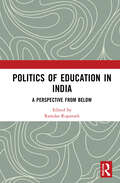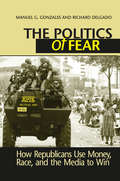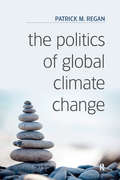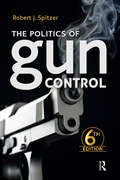- Table View
- List View
Politics and Identity in Chinese Martial Arts (Routledge Research in Sport, Culture and Society)
by Lu ZhouxiangChinese martial arts is considered by many to symbolise the strength of the Chinese and their pride in their history, and has long been regarded as an important element of Chinese culture and national identity. Politics and Identity in Chinese Martial Arts comprehensively examines the development of Chinese martial arts in the context of history and politics, and highlights its role in nation building and identity construction over the past two centuries. This book explores how the development of Chinese martial arts was influenced by the ruling regimes’ political and military policies, as well as the social and economic environment. It also discusses the transformation of Chinese martial arts into its modern form as a competitive sport, a sport for all and a performing art, considering the effect of the rapid transformation of Chinese society in the 20th century and the influence of Western sports. The text concludes by examining the current prominence of Chinese martial arts on a global scale and the bright future of the sport as a unique cultural icon and national symbol of China in an era of globalisation. Politics and Identity in Chinese Martial Arts is important reading for researchers, students and scholars working in the areas of Chinese studies, Chinese history, political science and sports studies. It is also a valuable read for anyone with a special interest in Chinese martial arts.
Politics and Legitimacy in Post-Soviet Eurasia
by Martin Brusis Joachim Ahrens Martin Schulze WesselPolitical legitimacy has become a scarce resource in Russia and other post-Soviet states. Their capacity to deliver prosperity has suffered from economic crisis, war in Ukraine and confrontation with the West. Will nationalism and repression enable political regimes to survive? This book studies the politics of legitimation in Post-Soviet Eurasia.
Politics and Leisure (Routledge Library Editions: Leisure Studies #Vol. 5)
by John WilsonFirst published in 1988. This book provides a lucid and exceptionally well-informed account at the controversial relationship between politics and leisure. The author combines historical and sociological material to show the ways in which ‘leisure’ has often been a fiercely disputed battleground. Free time and free space have always posed a threat to political authorities, while providing room for experimentation and expression for the citizenry. This has led to extensive attempts at leisure regulation; John Wilson examines the purposes and effectiveness of such regulation in the fields of games sexuality, the mass media, and gambling. He is able to draw on evidence of leisure planning and policy from a wide variety of political regimes, from communist and socialist through social democrat to liberal, conservative, and fascist. The importance of the relationship between political forces and leisure, in subjects as disparate as the future of the Olympic games and the future of full employment, has rarely been so evident. John Wilson has provided an excellent guide to its intricacies.
Politics and Passion: Toward a More Egalitarian Liberalism
by Michael WalzerThe distinguished political philosopher Michael Walzer offers a critique of liberal theory and demonstrates that crucial realities have been submerged in the evolution of contemporary liberal thought. In the standard versions of liberal theory, autonomous individuals deliberate about what ought to be done but in the real world, citizens also organize, mobilize, bargain, and lobby. The real world is more contentious than deliberative. Ranging over hotly contested issues including multiculturalism, pluralism, difference, civil society, and racial and gender justice, Walzer suggests ways in which liberal theory might be revised to make it more hospitable to the claims of equality. Combining profound learning with practical wisdom, Michael Walzer offers a provocative reappraisal of the core tenets of liberal thought. Politics and Passion will be required reading for anyone interested in social justice and the means by which we seek to achieve it.
Politics and Policies in Upper Guinea Coast Societies
by Jacqueline Knörr Christian K. Højbjerg William P. MurphyThis book examines the radical changes in social and political landscape of the Upper Guinea Coast region over the past 30 years as a result of civil wars, post-war interventions by international, humanitarian agencies and peacekeeping missions, as well as a regional public health crisis (Ebola epidemic). The emphasis on 'crises' in this book draws attention to the intense socio-transformations in the region over the last three decades. Contemporary crises and changes in the region provoke a challenge to accepted ways of understanding and imagining socio-political life in the region - whether at the level of subnational and national communities, or international and regional structures of interest, such as refugees, weapon trafficking, cross-border military incursions, regional security, and transnational epidemics. This book explores and transcends the central explanatory tropes that have oriented research on the region and re-evaluates them in the light of the contemporary structural dynamics of crises, changes and continuities.
Politics and Policy Making in Education: Explorations in Sociology (Routledge Library Editions: Education)
by Stephen J. BallBased on interviews with key actors in the policy-making process, this book maps the changes in education policy and policy making in the Thatcherite decade. The focus of the book is the 1988 Education Reform Act, its origins, purposes and effects, and it looks behind the scenes at the priorities of the politicians, civil servants and government advisers who were influential in making changes. Using direct quotations from senior civil servants and former secretaries of state it provides a fascinating insight into the way in which policy is made. The book focuses on real-life political conflicts, examining the way in which education policy was related to the ideal of society projected by Thatcherism. It looks in detail at the New Right government advisers and think tanks; the industrial lobby, addressing issues such as the National Curriculum, national testing and City Technical Colleges. The author sets these important issues within a clear theoretical framework which illuminates the whole process of policy making.
Politics and Political Elites in Latin America: Challenges and Trends (Latin American Societies)
by Manuel Alcántara Mercedes García Montero Cristina Rivas PérezThis book presents in-depth analyses of the data gathered for 26 years by the Political Elites of Latin America project (PELA), the most comprehensive database about the topic in the world. Since 1994, PELA has conducted around 9,000 personal interviews with representative samples of the Legislative Powers of 18 Latin American countries, generating a unique resource for the study of political elites in a comparative perspective. Now, this contributed volume brings together studies that dig into the data gathered by PELA to discuss important topics related to the challenges faced by representative democracy in Latin America. After an introductory chapter that presents the potential of the PELA database, the book is structured in two parts. The first addresses in eight chapters important aspects of representative democracy such as political ambition, political trust, satisfaction with democracy, clientelism and the quality of democracy. It then discusses three relevant issues in Latin American political dynamics such as executive-legislative relations, women's participation as representatives, and the meaning of China and the United States in national politics.The second part addresses in five chapters studies of seven national cases that are representative of regional heterogeneity. These chapters aim to examine parliamentarian elites’ attitudes in different political systems with regard to a variety of relevant issues such as institutional trust, satisfaction with democracy, Executive-Legislative relations, clientelism, and gender questions. Furthermore, these chapters intend to evince the evolution of such attitudes in the course of the last two decades.Politics and Political Elites in Latin America: Challenges and Trends will be of interest to scholars and students of comparative politics in general and, more particularly, to those interested in the challenges faced by representative democracy not only in Latin America, but in many parts of the world.
Politics and Power in the Multinational Corporation
by Christoph Dörrenbächer Mike GeppertThe current financial and economic crisis has negatively underlined the vital role of multinational companies (MNCs) in our daily lives. The breakdown and crisis of flagship MNCs, such as Enron, WorldCom, Lehman Brothers, Toyota and General Motors, does not merely reveal the problems of corporate malfeasance and market dysfunction. It also raises important questions, both for the public and the academic community, about the use and misuse of power by MNCs in the wider society, as well as the exercise of power by key actors within internationally operating firms. This book examines how issues of power and politics affect MNCs at three different levels; the macro-level, the meso-level and the micro-level. This wide-ranging analysis shows not only that power matters but also how and why it matters, pointing to the political interactions of key power holders and actors within the MNC, both managers and employees.
Politics and Practices of the Ethnographies of Biomedicine and STEM: Among White Coats
by Cinzia GrecoPolitics and Practices of the Ethnographies of Biomedicine and STEM: Among White Coats collects critical examinations of the politics, positionality, and epistemological and methodological issues of doing ethnography in a number of locales across the globe and in fields including computer science, astronomy, mining, biology, and medicine. The book captures a wide breadth of ethnographic case studies conducted by scholars at different stages of their careers, with various geographical backgrounds, and working across different settings and regions of the world, demonstrating the unfolding of overlapping concerns in unique ways. ‘Among White Coats’ is the first systematic and critical examination of the politics and epistemology of doing ethnography in biomedicine and STEM, adding to the extensive production of studies based on the ethnography of medicine and ethnography of science, as well as the ongoing debate on the foundation of ethnography. The book is geared toward academics and research students from different disciplinary backgrounds. It is a resource useful not only for students and Ph.D. candidates but also for expert ethnographers, presenting the most recent debates on ethnography and knowledge production in the STEM and biomedical fields. The book is partly a response to the growing awareness of the increasingly pertinent objective for ethnographers to reflect on their positionalities in their writing. Thus, this book offers a reflexive guide to thinking through the political and practical aspects of ethnographic practice.
Politics and Purges in China: Rectification and the Decline of Party Norms, 1950-65 (Routledge Revivals)
by Frederick C TeiwesDrawing upon released documents, memoirs and party-history works, the process and impact of the political campaigns in China between 1950 and 1965 is documented. Complete with extensive interviews with Chinese scholars and former officials, the book reviews the findings of the first edition.
Politics and Recognition: Towards a New Political Aesthetics (Classical and Contemporary Social Theory)
by Adam ChmielewskiThis book outlines a new conception of political aesthetics based on the notion of order as an aesthetic category pertaining to human perception. Engaging with the thought of a range of figures, including Veblen, Honneth, Foucault, Popper, and MacIntyre, it explores the nature of political aesthetics as an enquiry into the ways in which politics and our perceptions shape one another and our moral choices. Moving beyond the consideration of politics as a matter of perception, the author employs the concept of recognition to shed fresh light on the normative dimensions of politics, before presenting a series of case studies designed to show the utility of this conception of political aesthetics for explaining contemporary urban social phenomena and political conflicts. As such, Politics and Recognition will appeal to sociologists, philosophers, and political social theorists.
Politics and Social Theory (Routledge Revivals)
by Peter LassmanFirst published in 1989, this Routledge Revival is a major collection of essays on the competing traditions of social and political theory. The contributions, by international scholars, reflect the re-examination of the boundaries between the ‘political’ and the ‘social’, the ‘public’ and ‘private’, and ‘state’ and ‘society’. The reissue will be of great value to students in both sociology and political science. Bringing new arguments to bear on the debate about the place of political theory in social science, the contributors discuss such issues as the different languages used by sociologists to describe the state; Marxist and socialist theory; class analysis; the welfare state; feminist political theory; and the impact of post-modernity on contemporary social thought.
Politics and Violence in Central America and the Caribbean
by Hannes Warnecke-BergerThis book develops a comparative study on violence in Jamaica, El Salvador, and Belize based on a theoretical approach, extensive field research, and in-depth empirical research. It combines the Caribbean and Central America into a single comparative research that explores the historical (from the conquista onwards) as well as contemporary causes of violence in these societies. The volume focuses on forms of violence such as gang violence, police violence, every day forms of violence, vigilantism, and organized crime. The analysis provides a theoretical perspective that bridges political economy as well as cultural approaches in violence research. As such, it will be of interest to readers studying development, violence, political, Central American, and Caribbean studies.
Politics at Work: How Companies Turn Their Workers into Lobbyists
by Alexander Hertel-FernandezAmerican employers are increasingly recruiting their workers into politics to change elections and public policy--sometimes in coercive ways. Using a diverse array of evidence, including national surveys of workers and employers, as well as in-depth interviews with top corporate managers, Alexander Hertel-Fernandez's Politics at Work explains why mobilizing workers has become an appealing corporate political strategy in recent decades, and assesses the effect of employer mobilization on the political process more broadly, including its consequences for electoral contests, policy debates, and political representation. Hertel-Fernandez shows that while employer political recruitment has some benefits for American democracy--for instance, getting more workers to the polls--it also has troubling implications for our democratic system. Workers face considerable pressure to adhere to their managers' political requests because of the economic power employers possess over workers. In spite of these worrisome patterns, Hertel-Fernandez found that corporate managers view the mobilization of their own workers as an important strategy for influencing politics. As he shows, companies consider mobilization of their workers to be even more effective at advancing policy change than making campaign contributions or buying electoral ads. By carefully examining a growing yet underappreciated political practice, Politics at Work reveals the novel methods corporations have employed in recent years to increase their power over the American political process. It is essential reading for anyone interested in the connections between inequality, public policy, and American democracy. Alexander Hertel-Fernandez is Assistant Professor of International and Public Affairs at Columbia University. His research has appeared in the American Prospect, the New York Times, the New Yorker, the Washington Post, and Democracy Journal, as well as numerous scholarly journals.
Politics from Below: Essays on Subalternity and Resistance in India
by Alf Gunvald NilsenThis book is a collection of essays that question how subalternity is constituted and contested in Indian society. It draws on Antonio Gramsci's work to investigate the dynamics of hegemony, subalternity and resistance in India, both past and present. Drawing on the author's extensive fieldwork, Politics from Below presents detailed ethnographic studies of the movement against dam building in the Narmada Valley and Adivasi mobilization to democratize the local state in western India. The book will be relevant to students and scholars with an interest in social movements and the political economy of development and democracy in India, as well as to activists and engaged members of the public more generally. This title is co-published with Aakar Books. Print editions not for sale in South Asia (India, Sri Lanka, Nepal, Bangladesh, Pakistan and Bhutan)
Politics in America (7th Edition)
by Thomas R. DyeA lively and absorbing text exploring the struggle for power among the participants, the stakes involved, the processes adopted, and the institutions affected.
Politics in Malaysia: The Malay Dimension (Routledge Malaysian Studies Series #3)
by Edmund Terence GomezExamining some of the most critical issues in Malaysian politics today, including human rights, law and democracy, gender and Islam, this book explores the contours of the contemporary landscape of Malaysian politics, focusing especially on politics among the majority ethnic Malay community. In particular, the book explains why changes in patterns of political mobilization and the rhetoric of the dominant parties - particularly the PAS and UMNO - have been so limited, despite the overt and growing dissatisfaction shown by Malaysians with the state of their political system and the ability of these parties to represent their interests. It considers the recent history of events and discourses within Malaysian society, and UMNO and PAS, and goes on to analyze why important transitions have occurred in society yet political parties have not adapted themselves to these changes and remained reticent about instituting meaningful reforms involving these matters.
Politics in Organizations: Theory and Research Considerations (SIOP Organizational Frontiers Series)
by Gerald R. Ferris Darren C. TreadwayThis edited volume in the SIOP Frontiers series is one of the first to look at the psychological factors behind politics and power in organizations. Noted contributors from schools of management, psychology, sociology and political science look at the theory, research, methodology and ethical issues related to organizational politics and climates. The book is divided into three parts: Part 1 looks at the historical evolution of the field; Part 2 integrates organizational politics with important organizational behavior constructs and/or areas of inquiry, for example in the chapter by Lisa Leslie and Michele Gelfand which discusses the implications of cross-cultural politics on expatriates and within cross-national mergers; and Part 3 focuses on individual differences and organizational politics, focusing on the nature of political relationships.
Politics in Time: History, Institutions, and Social Analysis
by Paul PiersonThis groundbreaking book represents the most systematic examination to date of the often-invoked but rarely examined declaration that "history matters." Most contemporary social scientists unconsciously take a "snapshot" view of the social world. Yet the meaning of social events or processes is frequently distorted when they are ripped from their temporal context. Paul Pierson argues that placing politics in time--constructing "moving pictures" rather than snapshots--can vastly enrich our understanding of complex social dynamics, and greatly improve the theories and methods that we use to explain them. Politics in Time opens a new window on the temporal aspects of the social world. It explores a range of important features and implications of evolving social processes: the variety of processes that unfold over significant periods of time, the circumstances under which such different processes are likely to occur, and above all, the significance of these temporal dimensions of social life for our understanding of important political and social outcomes. Ranging widely across the social sciences, Pierson's analysis reveals the high price social science pays when it becomes ahistorical. And it provides a wealth of ideas for restoring our sense of historical process. By placing politics back in time, Pierson's book is destined to have a resounding and enduring impact on the work of scholars and students in fields from political science, history, and sociology to economics and policy analysis.
Politics in the Crevices: Urban Design and the Making of Property Markets in Cairo and Istanbul
by Sarah El-KazazIn Politics in the Crevices, Sarah El-Kazaz takes readers into the world of urban planning and design practices in Istanbul and Cairo. In this transnational ethnography of neighborhoods undergoing contested rapid transformations, she reveals how the battle for housing has shifted away from traditional political arenas onto private crevices of the city. She outlines how multiple actors—from highly capitalized international NGOs and corporations to city dwellers, bureaucrats, and planning experts—use careful urban design to empower conflicting agendas, whether manipulating property markets to protect affordable housing or corner luxury real estate. El-Kazaz shows that such contemporary politicizations of urban design stem from unresolved struggles at the heart of messy transitions from the welfare state to neoliberalism, which have shifted the politics of redistribution from contested political arenas to design practices operating within market logics, ultimately relocating political struggles onto the city’s most intimate crevices. In so doing, she raises critical questions about the role of market reforms in redistributing resources and challenges readers to rethink neoliberalism and the fundamental ways it shapes cities and polities.
Politics of Anti-Racism Education: In Search of Strategies for Transformative Learning
by George J. Sefa Dei Mairi McdermottThis collection of essays invites readers to think through critical questions concerning anti-racism education, such as: How does anti-racism education centre race as an analytic and simultaneously work with multiple sites of oppression, without reifying hierarchies of difference? How can anti-racism education be engaged to speak to historical questions of power and privilege, within conventional schooling practices? How do we recognize anti-racism education in its many iterations? In this book the authors explore the knowledge that constitutes anti-racism education and the ways in which knowledge constitutive of anti-racism education becomes embodied through particular pedagogues. The authors are anti-racism educators with experiences in diverse settings: the chapters cover various fields and socio-historic geographies, address contemporary educational issues, and are situated within personal-political, historical and philosophical conversations. Anti-racism education is a discursive stance and steeped in politics that shape and are shaped by everyday conversations, theories, and practices. The essays in this collection work through many of the possibilities and limitations of engaging in counter-hegemonic education for transformative learning. Readers will discover lived experiences, theory, practice and critical reflexivity.
Politics of Education in India: A Perspective from Below
by Ramdas RupavathThis book studies the state of tribal education in India. India has the single largest tribal population in the world, yet the tribal community remains one of the most economically impoverished and marginalized groups in the country. The volume • Examines the educational status of the tribal population and studies developmental issues such as unemployment, illiteracy, caste discrimination, and inequality faced by the community. • Studies the implementation and execution of welfare schemes, initiatives, and reforms in place to tackle issues faced by tribal students and identifies loopholes in the various centrally sponsored schemes. • Emphasizes the importance of the Right to Education Act and presents policy implications for the educational uplift of India’s very many millions of tribal people. A critical study of the Indian education system, this book will be indispensable to students and researchers of education, education policy, minority studies, indigenous studies, sociology of education, and South Asian studies.
Politics of Fear: How Republicans Use Money, Race and the Media to Win
by Richard Delgado Manuel G. Gonzales"Lucidly written, widely informed, and uncompromisingly honest -- a valuable expose." Michael Parenti "Documents the stunning success of a network of wealthy donors and corporations in creating and sustaining a set of think tanks, legal action groups, and media strategies." Gary Orfield, Harvard University What explains the electoral success of Republicans, particularly of the ascendant neoconservatives who now dominate the Party? Based on a thorough and up-to-date examination of the New Right over twenty-five years, The Politics of Fear proposes some provocative answers, including globalization, new technologies, and a far-reaching network of right-wing think tanks and foundations. As the authors show, all have opened the doors to a new politics of fear successfully waged by the neoconservatives. By manipulating insecurity, the New Right has created an extraordinarily successful populist conservative movement. Utilizing extensive documentation, the authors argue convincingly that the fear of immigrants and racial minorities has served as the most effective tactic in the GOP arsenal, while their approach also implicates gays, feminists, and terrorists. The book explains why Americans have willingly supported a party that promises them security, just as it delivers greater economic and political insecurity. The authors argue that, despite their striking political successes, neoconservatives have delivered to voters a set of policies harmful to working Americans in the way of regressive tax measures, military exploits, tort reform, deregulation, and environmental destruction.
Politics of Global Climate Change
by Patrick M. ReganIn 2009 the US House of Representatives passed legislation requiring reductions in greenhouse gas emissions by 18 percent over the coming decade. Later that year, President Obama went to Copenhagen to sign a treaty requiring reductions by 50 percent over a two-decade period. The President came back with nothing: no firm commitment to reduce emissions and only a vague target to hold global temperature rises to under 2 C. How does a President who has a 75-vote majority in the House and a 19-vote majority in the Senate who has pre-approval for a treaty reducing greenhouse gas production by 18 percent not achieve a treaty with at least the minimum goal of 18 percent reductions by 2020?Others have answered the puzzle by looking at institutional designs or negotiation dynamics. This book articulates a multilevel process that starts with local politics to explain how they can influence international negotiations and why President Obama s efforts in Copenhagen were doomed to fail. Understanding the role of local private interests can help form strategies for overcoming national resistance to climate change legislation and ultimately international agreements that could change the environmentally self-destructive course we are on. Features of this Innovative Text: "
Politics of Gun Control
by Robert J. SpitzerThe new edition of this classic text covers the latest developments in American gun policy, including shooting incidents plaguing the American landscape - especially Sandy Hook, the Colorado theatre shootings and the tragic death of Trayvon Martin - placing them in context with similar recent events. The incidents described in the book sparked a wave of gun control legislation at local, state and national levels, some of which was successful, some doomed and all controversial. At the national level, President Obama put his political capital on the line to push for new gun control measures, only to see them shot down by Congress. Robert J. Spitzer has long been a recognised authority on gun control and gun policy. His even-handed treatment of the issue - as both a member of the NRA and the Brady Center - continues to compel national and international interest, including interviews by the likes of Terry Gross, Tom Ashbrook and Diane Rehm. This sixth edition of The Politics of Gun Control provides the reader with up-to-date data and coverage of gun ownership, gun deaths, school shootings, border patrols and new topics including social media, stand-your-ground laws, magazine regulation, and shooting-related mental health initiatives.
